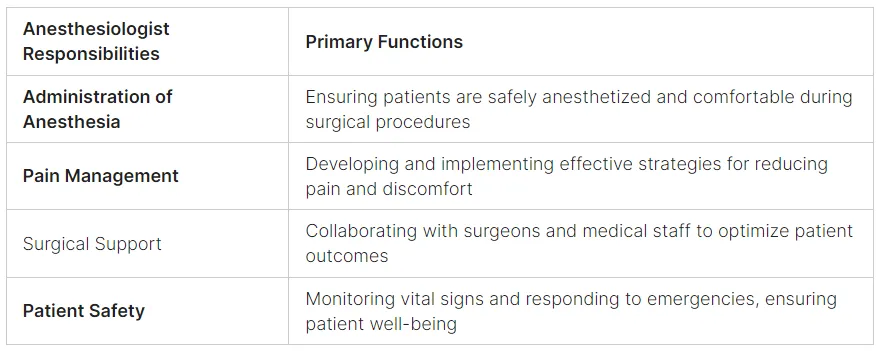Anesthesiologist Salary by Specialty: Unveiling Pay Variations Across Medical Fields

Author: Karen Alexander
Are you considering a career as an anesthesiologist? One important aspect to consider is the salary potential in this medical field. Anesthesiologists play a critical role in healthcare, administering anesthesia and ensuring patient safety during surgical procedures. But how much do they earn?
According to a study by Doximity, physician compensation declined by 2.4% in 2022. However, certain specialties continued to rank high in terms of average salary. Neurosurgery, thoracic surgery, orthopaedic surgery, plastic surgery, and vascular surgery were among the highest-compensated specialties. Anesthesiology, on the other hand, ranked 14th on the list, with an average salary of $462,506.
While anesthesiology may not be at the top in terms of average salary, it is important to consider other factors such as job satisfaction, work-life balance, and the opportunity to make a positive impact on patients' lives. Additionally, it's worth noting that compensation can vary depending on factors like experience, subspecialty, and geographic location.
Curious to learn more about the earning potential for anesthesiologists? Read on to discover the factors that can influence anesthesiologist salaries and gain insights into the different subspecialties within the field.
Key Takeaways:
- Anesthesiology ranked 14th in terms of average salary among medical specialties in 2022.
- Factors such as experience, subspecialties, and geographic location can influence anesthesiologist salaries.
- Consider other aspects besides salary, such as job satisfaction and the opportunity to make a positive impact on patients' lives.
- There are various subspecialties within anesthesiology, each with its own salary and unique requirements.
- Stay tuned to learn more about the earning potential for anesthesiologists in different regions of the United States.
The Role of Anesthesiologists in Healthcare
Anesthesiologists play a vital role in healthcare, contributing to surgical procedures and patient safety. Their expertise in the administration of anesthesia and pain management ensures that patients experience minimal discomfort during surgical procedures. Working alongside surgeons, nurses, and other medical professionals, anesthesiologists monitor vital signs, administer the appropriate amount of anesthesia, and ensure patient stability throughout the entire procedure.
Quotes:
"Anesthesiologists are indispensable members of the surgical team, responsible for the safe administration of anesthesia and the management of pain during surgery."
- Dr. Sarah Thompson, Chief of Anesthesiology
Anesthesiology has significantly evolved over the years, incorporating advancements in medical technology and pain management techniques. Anesthesiologists undergo rigorous training and education, equipping them with the necessary skills to manage anesthesia and provide optimal patient care.

Related: Tips for Negotiating Anesthesiologist Salary
Anesthesiologist Salary Overview
When considering a career as an anesthesiologist, understanding the salary landscape is crucial. According to the Bureau of Labor Statistics (BLS), the national average salary for anesthesiologists in 2023 is projected to be $302,970 per year or $145.66 per hour.
However, it is important to note that this figure represents the average salary and may vary based on several factors:
- Location: Anesthesiologists practicing in different regions may experience variations in salary due to the cost of living and demand for their services. For example, metropolitan areas often offer higher salaries compared to rural areas.
- Experience: As with most professions, anesthesiologists with more years of experience tend to earn higher salaries. Their expertise and track record contribute to their earning potential.
- Subspecialty: Anesthesiology offers various subspecialties, such as cardiac anesthesia, pediatric anesthesia, obstetric anesthesia, pain management, and critical care medicine. Salaries may differ based on the complexity and specialization requirements of each subspecialty.
It's important to note that these figures are estimates and can vary based on several factors. Anesthesiologists should consider their interests, aptitude, and societal needs when exploring different subspecialties.
By staying informed about salary trends and contemplating various factors, aspiring anesthesiologists can make informed decisions about their career paths and strive for a fulfilling and financially rewarding healthcare profession.
Related: Regional Variations in Anesthesiologist Salary
Factors Affecting Anesthesiologist Salary

An anesthesiologist's salary can be influenced by several factors, including geographic location, experience, subspecialties, promotions, advancements, and negotiating skills.
Geographic Location
One of the significant factors influencing an anesthesiologist's salary is the geographic location of their practice. Salaries tend to be higher in areas with a higher cost of living or a high demand for anesthesiology professionals. For example, major metropolitan areas often offer higher salaries due to increased demand and resource availability.
Experience
The amount of experience an anesthesiologist has is also a crucial factor in determining their earning potential. Generally, professionals with more years of experience tend to command higher salaries compared to those who are just starting their careers. Experience brings valuable expertise and skills that contribute to an anesthesiologist's ability to provide excellent patient care and manage complex cases.
Subspecialties
Anesthesiology offers various subspecialties, such as pain management or critical care medicine. Choosing to specialize in a particular area can impact an anesthesiologist's salary. Subspecialties often require additional training and certification, and the technical complexity and specialized knowledge involved can warrant higher salaries.
Promotions and Advancements
Advancing in one's career as an anesthesiologist can lead to salary increases. Promotions, such as becoming a department chief or obtaining board certification, often come with higher levels of responsibility and leadership roles, leading to higher compensation.
Negotiating Salary
The ability to negotiate salary can also play a role in determining an anesthesiologist's earnings. Having strong negotiation skills and being well-informed about industry standards and compensation benchmarks can help professionals secure higher salaries, especially when entering a new position or renegotiating terms.
By considering these factors - geographic location, experience, subspecialties, promotions, advancements, and negotiating salary - an anesthesiologist can make informed decisions about their career path and maximize their earning potential.
Related: Future Projections for Anesthesiologist Salary
Anesthesiology Subspecialties and Salary Differences

Anesthesiology is a diverse field that offers various subspecialties, each with its own unique focus and requirements. These subspecialties include:
- Cardiac anesthesia
- Pediatric anesthesia
- Obstetric anesthesia
- Pain management
- Critical care medicine
Each subspecialty requires additional training and certification beyond the basic requirements for becoming an anesthesiologist. These specialized areas of practice involve the administration of anesthesia and the management of patients in specific contexts such as cardiac surgeries, pediatric procedures, obstetric care, pain management, and critical care settings.
Salaries within these subspecialties can vary due to the technical complexity and specialized knowledge required. Some subspecialties, such as cardiac anesthesia and critical care medicine, may offer higher salaries compared to other subspecialties.
Being a cardiac anesthesiologist involves providing anesthesia and critical care management for patients undergoing cardiac surgeries, such as open-heart procedures and bypass surgeries. This subspecialty requires a deep understanding of cardiac physiology and the ability to handle complex cardiac procedures.
Pediatric anesthesia focuses on providing anesthesia and pain management for infants, children, and adolescents undergoing surgical procedures. This subspecialty requires expertise in managing the unique physiological and developmental needs of pediatric patients, ensuring their safety and comfort during surgery.
Obstetric anesthesia specializes in providing anesthesia for women during childbirth and managing pain during labor and delivery. Anesthesiologists in this subspecialty work closely with obstetricians to ensure the well-being of both the mother and baby during the birthing process.
Pain management subspecialists specialize in the diagnosis and treatment of various types of chronic pain conditions. They employ a multidisciplinary approach to help patients manage and alleviate their pain, utilizing techniques such as medication management, interventional procedures, and physical therapy.
Critical care anesthesiologists provide comprehensive care to critically ill patients in intensive care units (ICUs) and other critical care settings. They are responsible for managing patients on life support, monitoring vital signs, and making critical decisions to ensure the best possible outcomes for critically ill patients.
Related: Factors Influencing Salary Trends
Anesthesiologist Salary and Geographic Location

The salary of an anesthesiologist can vary depending on the geographic location of their practice. Salaries tend to be higher in metropolitan areas compared to non-metropolitan areas. This can be attributed to the higher demand for healthcare services in metropolitan areas and the access to resources they offer.
However, salary levels for anesthesiologists are not solely determined by location. Factors such as the cost of living and local economies also play a role in salary differences. Let's take a closer look at how geographic location can impact an anesthesiologist's salary:
- Metropolitan Areas: Anesthesiologists practicing in metropolitan areas often have access to larger hospitals and medical facilities, which can result in higher salaries. The demand for healthcare services in these areas is typically higher, leading to more opportunities and potentially higher compensation.
- Rural Areas: In contrast, anesthesiologists practicing in rural areas may experience lower salaries due to reduced demand. However, practicing in a rural area may come with other perks, such as increased time off or loan repayment incentives.
Anesthesiologist Salary Comparison by Metropolitan and Rural Areas

When considering a career as an anesthesiologist, it's important to carefully evaluate the geographic location and its impact on salary and quality of life. While salaries may vary based on location, it's also essential to assess other factors such as cost of living, lifestyle preferences, and future career opportunities.
Related: Average Annual Growth Rate of Anesthesiologist Salary
Conclusion
Anesthesiologist Salary
Anesthesiologist salaries can vary significantly based on several factors. One of the key factors is geographic location, with salaries often higher in metropolitan areas compared to rural areas. Experience also plays a crucial role, as anesthesiologists with more years of experience tend to have higher earning potential. Additionally, subspecialties within anesthesiology, such as cardiac anesthesia or critical care medicine, can impact salary levels due to their specialized nature.
Negotiation strategies can also influence anesthesiologist salaries. By effectively negotiating their compensation package, anesthesiologists can secure higher salaries and additional benefits. It's important to gather information on industry standards, understand your worth based on experience and qualifications, and effectively communicate and advocate for your desired salary.
By considering factors such as geographic location, experience, subspecialties, and negotiation strategies, anesthesiologists can make informed decisions about their career paths and optimize their earning potential. Staying updated on industry trends and continuously developing skills and knowledge in the field can further contribute to a successful and rewarding career in healthcare.
Consider wanting a long-term position with your specialty. Anesthesiologists are in high demand as permanent hire physicians. Give us a call at 510.335.2265 to learn more or book a consultation call by using the calendar link here.
____________________________________________________________________________________
FAQ
What is the national average salary for anesthesiologists?
The national average salary for anesthesiologists in 2023 is projected to be $302,970 per year or $145.66 per hour, according to the Bureau of Labor Statistics (BLS).
What factors can influence an anesthesiologist's salary?
An anesthesiologist's salary can be influenced by factors such as geographic location, experience, subspecialties, promotions, advancements, and negotiating skills.
What subspecialties exist within anesthesiology?
Anesthesiology offers a range of subspecialties, including cardiac anesthesia, pediatric anesthesia, obstetric anesthesia, pain management, and critical care medicine.
How does geographic location affect anesthesiologist salaries?
Salaries for anesthesiologists tend to be higher in metropolitan areas compared to non-metropolitan areas due to higher demand for healthcare services and access to resources.
What are the earning potential and career prospects for anesthesiologists?
Factors such as geographic location, experience, subspecialties, and negotiation strategies can significantly impact an anesthesiologist's earning potential and career prospects.




